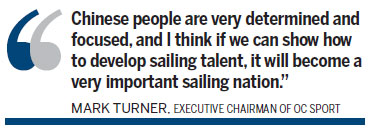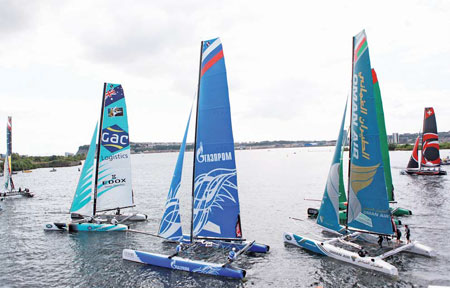Sailing with the winds of change
By Zhang Chunyan ( China Daily )
Updated: 2014-09-22
Growing acceptance of the sport may help bring in more sponsors
In one race the contestants are like gladiators fighting for supremacy in an amphitheater, and in the other the big adversary is the fiercest ocean storms you can imagine. The first event calls for tactical knowledge in a race that can be over in just 20 minutes, and the other calls for the stamina and toughness needed for nine months at sea.
The two events are the Extreme Sailing Series and the Volvo Ocean Race, and while they could hardly be any more different, they do have at least one thing in common: Organizers would be happy to see more Chinese take part in the sport and business, which has tended to be a preserve of the West.
However, the winds of change that have blown through yachting over the past six years are evident in how important Qingdao, in Shandong province, has become to the sport. That is due largely to the huge fillip it received when Qingdao hosted yachting and sailing events for the Olympic Games six years ago.
In May, the third race in this year's Extreme Sailing Series, featuring teams from nine countries, was held there. It was the fourth year in a row, but there was still one thing missing: a team from China.
Mark Turner, executive chairman of OC Sport, the global marketing company that organizes the series and other events such as running, cycling and winter sports, says: "We have still not managed to put together a Chinese team for a whole year, and this is a big objective for us."
OC Sport was founded by Turner in 1993. He teamed four years later with Ellen MacArthur from the United Kingdom, a former holder of the record for the fastest yachting circumnavigation of the globe. Turner says that one of the company's missions is to change the way sailing is seen and to "use sport to inspire the public, sponsors and cities alike to take on new challenges".
The company is keenly aware of the importance of training youngsters to be sailors, something that applies particularly to China. It manages the Dongfeng Race Team, half of whose 12 members are Chinese, which was established after the 2008 Olympics. It is the first time the team has had more than one Chinese member in its crew. The team, whose chief sponsor is Dongfeng Trucks of Shiyan, Hubei province, is one of the seven entrants in the next Volvo Ocean Race, which sets off from Alicante, Spain, on Oct 4 and finishes in Gothenburg, Sweden, at the end of June. The other entrants are from Abu Dhabi, Brunei, Norway, Spain and Sweden, and there is a joint Turkey/US team.
"The Chinese people on the Dongfeng Race Team are really good sailors, but we need to have the money so they can have their own team, and I want to make that happen," Turner says. For the race in 2017-18, the aim is for the majority of the team to be Chinese and for the 2020-21 race, 100 percent Chinese.
Chinese sailors tend to be extremely young and lack experience, he says.
"We are trying to make them like the guys who have 20 years' experience and have been sailing since they were six. In China you don't have anyone like that."
In recent years OC Sport has demonstrated how serious it is about showing novices across the globe the ropes of sailing by building national teams in what might be regarded as unexpected locations. It promotes the sport in places where sailing is not prominent such as Brazil, Oman, Russia and Turkey.
"When we started the project in Oman in 2007, there were no sailors or boats there," Turner says. "Now it's a great sailing nation. We had to learn how to communicate to an Arab audience, a different culture, and that's what we have to do now in China.
"Chinese people are very determined and focused, and I think if we can show how to develop sailing talent, it will become a very important sailing nation."
But for this to happen, Turner says, Chinese sailors need the financial underpinning of sponsorship, something that is an important component in events such as the Extreme Sailing Series. However, the Catch-22 of this is that to attract such sponsorship, the sailors need to have more to show for themselves, he says.
Extreme sailing presents not only an opportunity to expose new audiences to yachting, he says, but also to "make an event that is a sport and business, something that companies want to use for their business".
Most Western athletes and sports organizers use sponsorship to meet financial costs, but, by and large, Chinese companies remain blind to sponsorship's benefits, Turner says.
"Every boat has sponsors. We have the cities to invest, teams who invest. This is commercial, like most professional sports. Ultimately it's about making it work for businesses, and to make it work for businesses you need to make it work for the public and for the VIPs and the clients of the sponsors."
If the Dongfeng Race Team does well in the Volvo Ocean Race, it could open doors to a wide range of opportunities for both athletes and businesses in China, many of which are looking to expand their reach and boost their image, he says.
As for Qingdao, whose main claim to fame has been its beer industry and its German connections, it now basks in the nickname of the Sailing City, and Turner says that in yachting terms it is the place in China to be.
Someone who has a soft spot for the city is the British Olympian Sarah Ayton, who won a gold medal, her second, there in 2008. Big changes made to the marina facilities since then have been impressive, she says, as has been the number of young people who took up yachting as a result of the Games.
"From having no sailors in Qingdao to having a fleet of sailors out there was incredible, and that's what it's about. The Olympic Games have to make a difference, and to see the children out there sailing is a massive deal."
Xu Lijia, a Chinese gold medalist in sailing at the 2012 Olympics, is proof that the country has very talented sailors, Ayton says.
"Once you have champions in a country, it breeds success," she says, and such success is important in drawing sponsors.
Those positive signs aside, getting yachting to become a mainstream sport in China will be far from plain sailing, partly because it is hardly known to most people, and also because of people's attitude toward professional sports, Turner says.
"In the UK or France, it is a very credible, smart thing if you can become a professional sports person, and that's not there in China. Many of the parents of the guys on the Dongfeng Team don't agree with what they are doing. They think they should be working in an office."
Nevertheless, Turner is highly optimistic about sailing in China. In the early 15th century, China was the world's leading maritime power, when it began building huge ocean-bound sailboats, he says.
"China has sailing in its genes, and for 600 years it's been ignored, but I truly believe that in 20 years China can be the top sailing nation."
Carolynn Look contributed to this story.

|
The worldwide Extreme Sailing Series, the sailing equivalent of Formula 1 racing, has stressed China's importance as a sailing market even without a Chinese team's participation. Zhang Chunyan / China Daily |
(China Daily 09/22/2014 page15)




